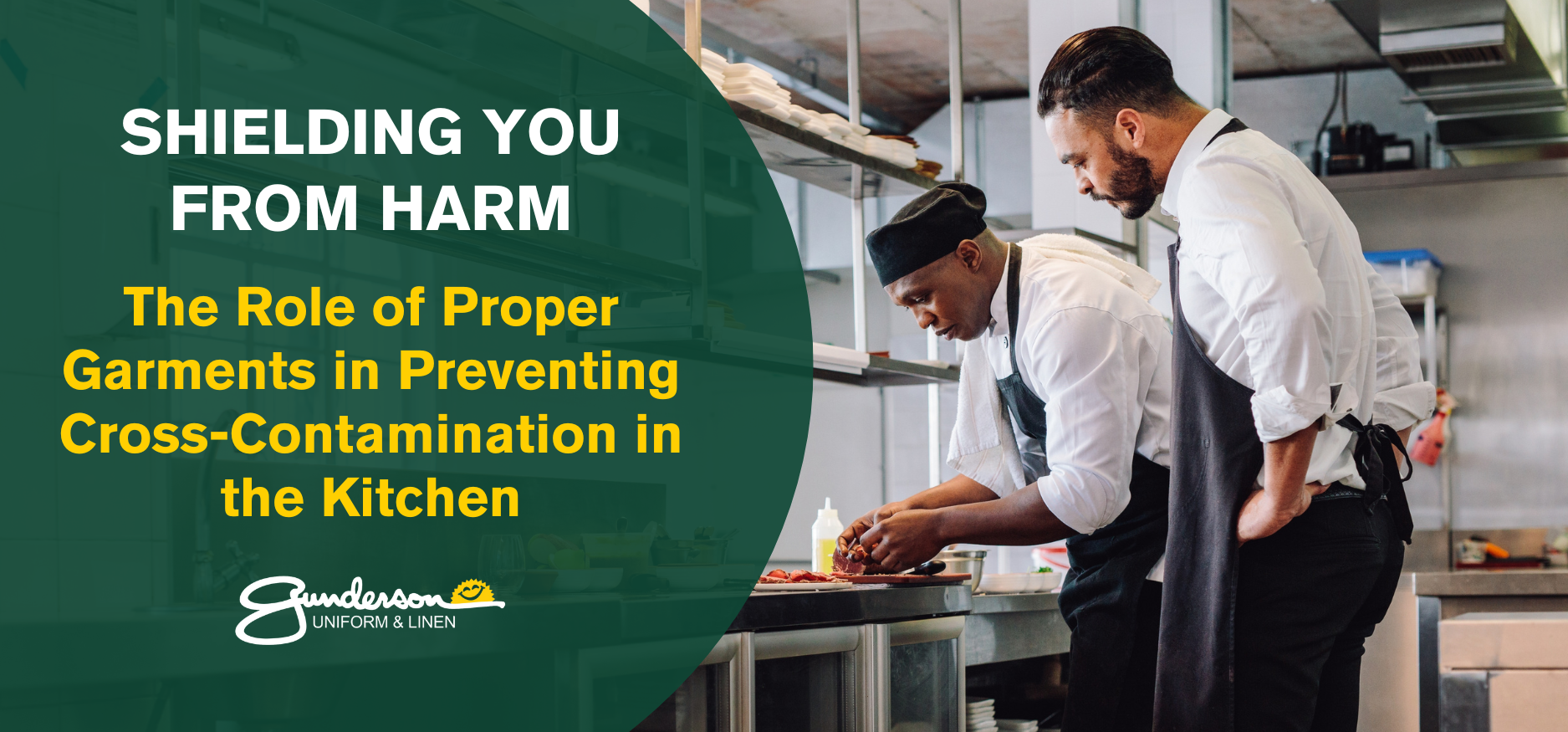Chef and Kitchen Uniforms: The Line of Defense Against Cross-Contamination in Restaurants

Maintaining a clean environment in kitchens and restaurants is crucial for compliance and safety, especially when it comes to preventing cross-contamination. Day in and day out, food service managers work tirelessly to uphold high standards of hygiene to protect both their customers and their businesses.
The best way to prevent cross contamination is by using proper protective garments. Every kitchen and restaurant worker must understand the essential role these garments play in safeguarding food from bacteria and other contaminants, which is why we are committed to providing information and services that uphold the highest standards of cleanliness and safety.
Why Are Hygienically Clean Uniforms Important?
When you’re working with food, cleanliness, and safety are key to preventing illness in customers. Yet, there’s a hidden source of bacteria walking around your kitchen every single day, and it might not be at the forefront of your mind.
Contaminated uniforms are one of the largest hidden sources of bacteria and other harmful pathogens that can easily transfer to food, leading to illness. This is why it’s so important to ensure that all protective garments and uniforms used in your restaurant are hygienically clean.
How Can Uniforms Prevent Cross-Contamination?
In kitchens and restaurants, uniforms are actually considered a “food prep surface” similar to your cutting boards and utensils, and different types of uniforms serve specific purposes in preventing cross-contamination. For example, aprons and smocks act as a barrier between the food and the worker’s everyday clothing, which could harbor bacteria.
Hairnets prevent hair and their associated bacteria from falling into food, while gloves and shoe covers reduce the transfer of pathogens from hands and feet. Each piece of protective clothing is designed with both safety and hygiene in mind, ensuring that contaminants are kept away from food products.
What Kinds of Bacteria Can Exist on Uniforms?
To understand the gravity of the bacteria that can thrive on uniforms in a kitchen or restaurant setting, you need to understand the types of bacteria we’re dealing with. Pathogens like Salmonella, E. coli, Listeria, and Staphylococcus aureus are some of the most common culprits that cause serious illness if consumed.
If they contaminate food, these bacteria can cause unpleasant symptoms, which can take minutes, hours, days, or weeks to appear and may last longer.
These bacteria can be introduced to food through contact with contaminated surfaces, including uniforms, which is why it’s so important to make sure that all protective garments are properly cleaned and sanitized to reduce the risk of these bacteria spreading.
How to Prevent Cross-Contamination Through Uniforms
Preventing cross-contamination through uniforms starts with establishing and incorporating strict cleanliness protocols. Kitchens and restaurants must ensure that uniforms are laundered regularly using processes that meet hygienic standards.
Additionally, workers should change uniforms moving between different food preparation tasks, especially when handling raw and cooked foods, to prevent the spread of contaminants.
Managers must also train staff on the importance of keeping their uniforms clean and free from contaminants. These steps are vital in maintaining a safe food service environment.
Kitchens and Restaurants Aren’t Alone
Ensuring that uniforms meet hygienic standards isn’t just the responsibility of kitchens and restaurants. Regular laundering using appropriate processes that meet hygienic standards is critical, but certifications such as the TRSA Hygienically Clean certification play a vital role. These certifications involve rigorous testing and inspections to verify that the garments are free from harmful levels of bacteria and other pathogens.
These certifications involve rigorous testing and inspections to verify that the garments are free from harmful levels of bacteria and other pathogens. By adhering to certified processes, food service facilities can ensure that their uniforms contribute to a safe and hygienic environment, reducing the risk of cross-contamination and protecting both employees and customers from potential health risks.
What Does It Mean to be TRSA Hygienically Clean Certified?
Maintaining TRSA Hygienically Clean certification involves a continuous commitment to process improvement, employee training, and stringent audits of your facilities. This rigorous approach ensures that every garment and linen that passes through the cleaning facility is processed to the highest hygienic standards. The purpose and focus of being TRSA Hygienically Clean is not just on cleaning uniforms, but on protecting your customers from potential health risks.
The TRSA’s Hygienically Clean program is unique in that it certifies the cleanliness of the products, not just the processes, ensuring that every garment meets appropriate hygienic standards before it reaches your business. This dedication to cleanliness means you can trust that the protective garments are more than just clean—they are a shield against cross-contamination.
Trust in Gunderson for a Safer, Cleaner Environment
We take our role in preventing cross-contamination seriously, so we’re committed to providing TRSA-certified hygienically clean garments. We can help ensure that your kitchen or restaurant maintains the highest standards of cleanliness, protecting your customers and your reputation. When you choose Gunderson, you’re choosing a partner committed to safeguarding your business from the risks of cross-contamination.
We have invested heavily in advanced laundering processes, state-of-the-art technology, and rigorous training to ensure that every garment we provide meets the highest cleanliness standards, which is validated by our TRSA Hygienically Clean certification. This certification is not just about adhering to guidelines; it’s about ensuring that the garments we provide actively contribute to preventing cross-contamination in your establishment.
To work with a Gunderson industry expert, contact us for a free consultation today.
